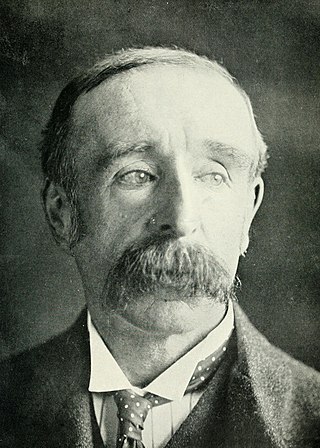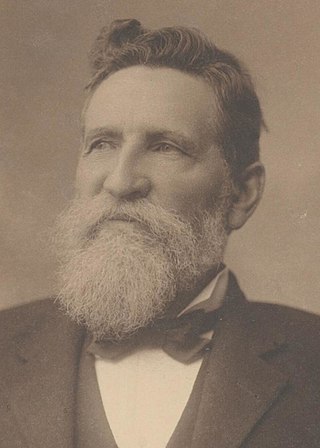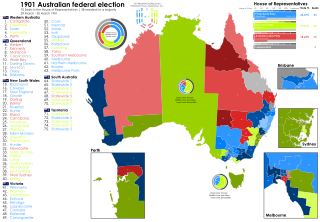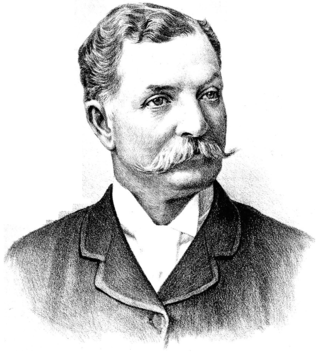
Sir George Houston Reid was an Australian and British politician, diplomat and barrister who served as the fourth prime minister of Australia from 1904 to 1905. He held office as the leader of the Free Trade Party, previously serving as the 12th premier of New South Wales from 1894 to 1899, and later as the High Commissioner of Australia to the United Kingdom from 1910 to 1916.
The Free Trade Party, officially known as the Free Trade and Liberal Association, and also referred to as the Revenue Tariff Party in some states, was an Australian political party, formally organised in 1887 in New South Wales, in time for the 1887 New South Wales colonial election, which the party won.

Lindsay James Tanner is a former Australian politician. A member of the Australian Labor Party (ALP), he represented the seat of Melbourne in the House of Representatives from 1993 to 2010 and served as Minister for Finance in the Rudd and Gillard governments from 2007 to 2010.
The Liberal Party was a parliamentary party in Australian federal politics between 1909 and 1917. The party was founded under Alfred Deakin's leadership as a merger of the Protectionist Party and Anti-Socialist Party, an event known as the Fusion.

Sir William John Lyne KCMG was an Australian politician who served as Premier of New South Wales from 1899 to 1901, and later as a federal cabinet minister under Edmund Barton and Alfred Deakin. He is best known as the subject of the so called "Hopetoun Blunder", unexpectedly being asked to serve as the first Prime Minister of Australia but proving unable to form a government.

Patrick McMahon Glynn KC was an Irish-Australian lawyer and politician. He served in the House of Representatives from 1901 to 1919, and was a government minister under three prime ministers, as Attorney-General (1909–1910), Minister for External Affairs (1913–1914) and Minister for Home and Territories (1917–1920). Prior to entering federal politics, Glynn was involved in the drafting of the Constitution of Australia. Born in Ireland, he arrived in Australia in 1880 and served three terms in the South Australian House of Assembly, as well as a brief stint as Attorney-General of South Australia.

Henry Bournes Higgins KC was an Australian lawyer, politician, and judge. He served on the High Court of Australia from 1906 until his death in 1929, after briefly serving as Attorney-General of Australia in 1904.

Allan McLean was an Australian politician who served as the 19th Premier of Victoria, in office from 1899 to 1900. He was later elected to federal parliament, where he served as a government minister under George Reid.

Alexander Poynton OBE was an Australian politician. He held ministerial office under Prime Minister Billy Hughes, serving as Treasurer (1916–1917), Minister for Home and Territories (1920–1921), and Postmaster-General (1921–1923).

Sir Alexander James Peacock was an Australian politician who served as the 20th Premier of Victoria.

The 1901 Australian federal election for the inaugural Parliament of Australia was held in Australia on Friday 29 March and Saturday 30 March 1901. The elections followed Federation and the establishment of the Commonwealth of Australia on 1 January 1901. All 75 seats in the Australian House of Representatives, six of which were uncontested, as well as all 36 seats in the Australian Senate, were up for election.

Thomas William Crawford was a long-serving member of the Australian Senate and joint Father of the Senate.

Sir Francis Bathurst Suttor was an Australian pastoralist, politician, and sheep and horse breeder.

The 1910 Australian federal election was held in Australia on 13 April 1910. All 75 seats in the House of Representatives, and 18 of the 36 seats in the Senate were up for election. The incumbent Liberal Party led by Prime Minister Alfred Deakin was defeated by the opposition Australian Labor Party (ALP) led by Andrew Fisher.

James Newton Haxton Hume Cook CMG was an Australian politician. He was a member of the House of Representatives from 1901 to 1910, after previously serving in the Victorian Legislative Assembly from 1894 to 1900. He was a member of the anti-socialist parties and served as a minister without portfolio under Alfred Deakin.

Charles Carty Salmon was an Australian politician who served as the second speaker of the Australian House of Representatives from 1909 to 1910. A member Protectionist Party for most of his career, he was the member of parliament (MP) for the division of Laanecoorie from 1901 to 1913 and the division of the Grampians from 1915 until his death in 1917.

John Daniel FitzGerald was a politician, union official, journalist and barrister in New South Wales, Australia.
Thomas Michael Burke, CMG was an Australian businessman and philanthropist.
The People's Party was a political organisation in the Australian state of Victoria. It was established in 1910 by farmers opposed to the Australian Labor Party (ALP). It co-ordinated political campaigns with other anti-Labor organisations, supporting the parliamentary Liberals and later the Nationalists after 1917. It merged into the National Federation in 1917, after an earlier abortive merger with the Commonwealth Liberal Party.

Edward Elliott Roberts was a clerk, administrator, politician and a Chief President of the Australian Natives' Association (ANA).

















